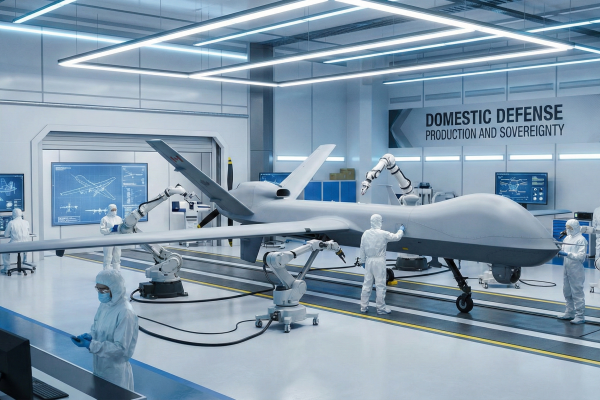July 29th, 2025 | 07:30 CEST
Drone hype: Who is getting the best deal? Volatus Aerospace, Renault, Rheinmetall
The days of tanks and howitzers are over. The war in Ukraine shows that drones are changing the face of combat—they provide reconnaissance, carry out precision strikes, and score points with low acquisition costs and high effectiveness. It is no wonder that major arms manufacturers and industrial companies want to jump on the drone bandwagon. Renault has even been asked by the French government to enter the business. But the barriers to entry in this market are high. We explain who is likely to profit from the drone business in the future and why size and capital are no guarantee of long-term success.
time to read: 3 minutes
|
Author:
Nico Popp
ISIN:
RHEINMETALL AG | DE0007030009 , RENAULT INH. EO 3_81 | FR0000131906 , VOLATUS AEROSPACE INC | CA92865M1023
Table of contents:
Author
Nico Popp
At home in Southern Germany, the passionate stock exchange expert has been accompanying the capital markets for about twenty years. With a soft spot for smaller companies, he is constantly on the lookout for exciting investment stories.
Tag cloud
Shares cloud
Renault and Rheinmetall jump on the drone bandwagon
While the automotive industry is struggling, orders from the defense sector could help fill the gap. Such thoughts have been circulating in Germany for some time. But since the US Vice President's memorable appearance at the Munich Security Conference in February, ideas are quickly turning into reality. Renault has not yet complied with the French government's request, but the automotive industry's manufacturing expertise could help bring smart drones to market in large quantities and thus at low cost.
Rheinmetall, the German defense contractor best known for its tanks, ammunition, and air defense systems, is also entering the drone business. In June 2025, Rheinmetall entered into a strategic partnership with US drone developer Anduril Industries to jointly develop military drones for Europe. According to the Reuters news agency, the plan is to develop European versions of Anduril's Barracuda and Fury unmanned systems and to jointly produce rocket engines. Rheinmetall is contributing its industrial manufacturing capabilities and access to the European market, while Anduril is providing its advanced drone technology. The aim is to reduce Europe's dependence on US defense technology. It is no coincidence that even established defense companies are looking for specialized partners: the barriers to entry into the drone market are high.
Market entry barriers due to regulations and the interaction of different technologies
Modern military drones have long incorporated various technologies. Specifically, these include AI-controlled navigation, high-resolution sensors, and encrypted data and communications. New players in the drone market must first acquire the necessary knowledge to utilize these technologies effectively in drones. Partnerships with existing drone companies therefore offer significant advantages, as they possess many years of experience in developing new drone systems and implementing them in practice. In addition, the use of drones is highly regulated. While in the military sector, it is important to meet the requirements of military alliances such as NATO, civilian use is all about safety and air traffic law. Drone companies that are not compliant with regulations will hardly get beyond pilot projects.
Volatus Aerospace: Long-standing experience pays off
The Canadian company Volatus Aerospace has been active since 2018 as a specialized provider of hardware, services, and training for both the civil and military sectors. Volatus trains drone pilots, offers border surveillance and infrastructure inspection services, and supplies modern drones. Just a few weeks ago, it succeeded in winning a NATO country as a customer, demonstrating that it is compatible both technologically and in terms of regulations. This comes as no surprise: Volatus Aerospace has been working diligently for years to navigate the regulatory landscape in the civil sector, serving on committees and actively participating in the decision-making process. The know-how acquired in this context also benefits the military sector and facilitates contact with potential new customers who value technological and regulatory compatibility.
The Condor XL heavy-lift drone program, which addresses the growing demand for autonomous transport drones and was only recently announced, demonstrates how well civil and military objectives complement each other at Volatus Aerospace. The Condor XL is based on a concept originally developed by Drone Delivery Canada and is designed to transport up to 180 kg over 200 km. Volatus is contributing its many years of experience with helicopters and its own avionics to the development of this program. The German Armed Forces are also currently conducting research in this area: An article in the Bild newspaper presents the unmanned transport drone "Grille", which is designed to transport injured individuals from the battlefield. The project is currently still in development and offers a shorter range than Condor XL. Both projects demonstrate the direction unmanned aerial vehicles are heading and that Volatus Aerospace is well-positioned with its projects.
Market for military drones set to grow – Volatus is perfectly positioned
According to analysts at Market Research Future, new developments and innovations will ensure that the market for military drones alone will grow at an annual rate of 7% to USD 30.5 billion by 2035. The analysts cite surveillance, combat, logistics, reconnaissance, and training as growth areas for drones. With its business model, Volatus Aerospace is well-positioned to benefit from this trend. As an experienced company with long-standing employees, Volatus Aerospace could also be the perfect partner when it comes to producing drones on a large scale. The partnership between Rheinmetall and Aduril provides the blueprint for this. In addition to Renault, there are other potential partners for Volatus. The share price has fallen significantly recently and could be interesting at the current level for speculative-minded independent investors who want to capitalize on the trend toward military and civilian drones.
Conflict of interest
Pursuant to §85 of the German Securities Trading Act (WpHG), we point out that Apaton Finance GmbH as well as partners, authors or employees of Apaton Finance GmbH (hereinafter referred to as "Relevant Persons") currently hold or hold shares or other financial instruments of the aforementioned companies and speculate on their price developments. In this respect, they intend to sell or acquire shares or other financial instruments of the companies (hereinafter each referred to as a "Transaction"). Transactions may thereby influence the respective price of the shares or other financial instruments of the Company.
In this respect, there is a concrete conflict of interest in the reporting on the companies.
In addition, Apaton Finance GmbH is active in the context of the preparation and publication of the reporting in paid contractual relationships.
For this reason, there is also a concrete conflict of interest.
The above information on existing conflicts of interest applies to all types and forms of publication used by Apaton Finance GmbH for publications on companies.
Risk notice
Apaton Finance GmbH offers editors, agencies and companies the opportunity to publish commentaries, interviews, summaries, news and the like on news.financial. These contents are exclusively for the information of the readers and do not represent any call to action or recommendations, neither explicitly nor implicitly they are to be understood as an assurance of possible price developments. The contents do not replace individual expert investment advice and do not constitute an offer to sell the discussed share(s) or other financial instruments, nor an invitation to buy or sell such.
The content is expressly not a financial analysis, but a journalistic or advertising text. Readers or users who make investment decisions or carry out transactions on the basis of the information provided here do so entirely at their own risk. No contractual relationship is established between Apaton Finance GmbH and its readers or the users of its offers, as our information only refers to the company and not to the investment decision of the reader or user.
The acquisition of financial instruments involves high risks, which can lead to the total loss of the invested capital. The information published by Apaton Finance GmbH and its authors is based on careful research. Nevertheless, no liability is assumed for financial losses or a content-related guarantee for the topicality, correctness, appropriateness and completeness of the content provided here. Please also note our Terms of use.




